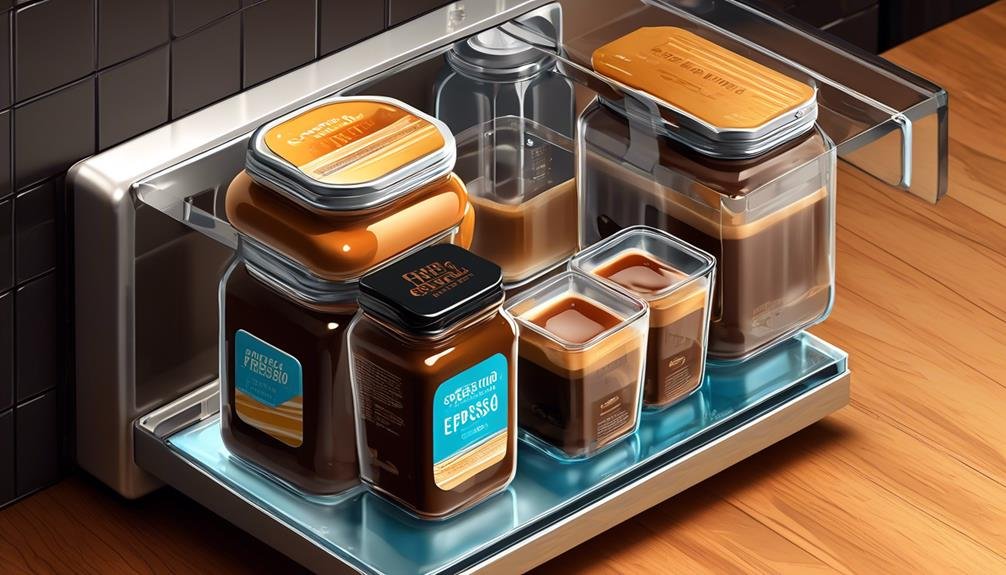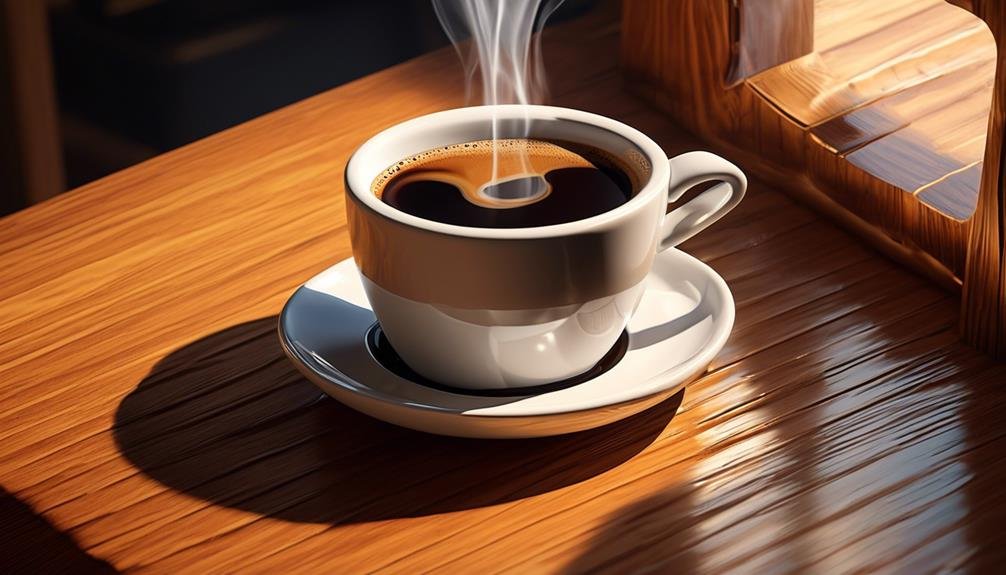So, you've brewed yourself a delicious cup of espresso and now you're wondering how long it will stay fresh before it goes bad.
Well, buckle up and get ready for a taste of knowledge, because we're about to dive into the world of espresso shelf life.
But first, let's address the elephant in the room – how long can you actually keep that liquid gold before it starts to lose its charm?
Well, my friend, the answer may surprise you.
Key Takeaways
- Brewed espresso is best consumed immediately for optimal taste and freshness.
- At room temperature, brewed espresso can last for up to 24 hours before its flavor deteriorates.
- Storing brewed espresso in the refrigerator can extend its shelf life for an additional day.
- Freezing brewed espresso can help preserve its taste and quality for long-term storage.
Shelf Life of Brewed Espresso
The shelf life of brewed espresso can vary depending on storage conditions and any additional ingredients used. When brewed, espresso is best consumed immediately for optimal taste and freshness. However, if you need to store it, there are a few factors to consider.
At room temperature, brewed espresso can last for up to 24 hours before its flavor starts to deteriorate. To extend its shelf life, it's recommended to store brewed espresso in the refrigerator. When stored properly in the fridge, brewed espresso can last for an additional day before experiencing flavor deterioration.
If you want to store espresso shots for a longer period, the freezer is your best option. Freezing espresso can help preserve its taste and quality for long-term storage.
It's important to note that the presence of milk, sweeteners, or additives can shorten the shelf life of brewed espresso. Therefore, it's best to add these ingredients just before consuming the drink.
Factors Affecting Espresso's Shelf Life
To ensure the freshness and quality of brewed espresso, several factors can affect its shelf life. Here are some key factors to consider:
- Different types of espresso drinks may have varying shelf lives in the fridge, with shots with milk or additives spoiling more quickly than straight espresso shots.
- The presence of milk, sweeteners, or other additives can shorten the shelf life of espresso shots in the fridge, impacting their freshness and safety.
Using an airtight glass container with a tight-fitting lid for storage can help extend the shelf life of brewed espresso and prevent oxidation and bacteria growth.
Factors such as moisture, oxygen, sunlight, and heat can affect the freshness of espresso, making proper storage in a cool, dry place away from sunlight crucial for maintaining its quality.
Understanding these factors can help you make informed decisions about how long your brewed espresso will last and how to store it properly. By considering the type of coffee, the presence of additives, and the brewing techniques used, you can maximize the shelf life and enjoy the best flavor and quality in each cup.
Remember to store your brewed espresso in an airtight container, away from moisture, oxygen, sunlight, and heat to preserve its freshness for as long as possible.
Storing Brewed Espresso in the Fridge

Storing brewed espresso in the fridge can extend its shelf life and maintain its freshness for an extra day. While brewed espresso can typically last up to 24 hours at room temperature, refrigeration can help it stay safe to drink for an additional day. To achieve this, it's crucial to store the espresso properly.
First, transfer the brewed espresso into an airtight glass container with a tight-fitting lid. This will help prevent oxidation and bacteria growth. It's recommended to store the espresso without any milk, sweeteners, or additives, as these can shorten its shelf life.
When storing in the fridge, make sure to keep the temperature below 40°F (4°C). This will help preserve the quality and taste of the espresso. Remember that the flavor and aroma of espresso degrade over time, so it's best to consume it fresh for the best experience.
If you want to store brewed espresso for longer periods, consider freezing it. Pour the espresso into ice cube trays and, once frozen, transfer the cubes to a plastic bag. This method can help preserve the taste and quality of the espresso for up to two weeks.
Storing Brewed Espresso in the Freezer
After properly storing brewed espresso in the fridge, the next step is to discuss the option of preserving it in the freezer. Freezing brewed espresso can extend its shelf life indefinitely, allowing you to enjoy its maximum flavor for a longer period of time. Here are some facts about storing brewed espresso in the freezer:
- Freezing espresso in ice cube trays and transferring them to a plastic bag is a convenient storage method. This way, you can easily grab a cube whenever you want to make a drink, without wasting any espresso.
- Each espresso cube can be used for a single drink, ensuring that the taste and quality of the espresso are preserved.
- Properly stored espresso can be kept in the freezer for long-term storage. This means you can have a supply of brewed espresso ready whenever you need it.
- Freezing espresso is a good option for extending its shelf life. It helps to maintain the flavor profile of the espresso by slowing down the oxidation process and preserving the oils and aroma of the coffee.
How Long Does Crema Last in Espresso?

Crema in properly made espresso typically lasts for 2 to 4 minutes, depending on factors such as bean quality, freshness, and roast level. Crema is the golden-brown layer of foam that forms on top of a well-brewed espresso shot. It's a sign of a well-extracted shot and is responsible for delivering the flavors and aromas of the espresso.
The crema is formed when carbon dioxide, released during the roasting process, comes into contact with the espresso's oils and forms bubbles. As the carbon dioxide dissipates, the crema begins to break down. The disappearance of crema after about 10 seconds is an indication that adjustments may need to be made to the machine settings or the beans being used.
It is important to note that crema doesn't affect the shelf life of the brewed espresso. The shelf life of brewed espresso is typically around 24 hours to 3 days, depending on storage conditions and the presence of additives like milk or sweeteners. Storing espresso in the freezer overnight is an option, but reheating may affect the taste and crema, so it's recommended to consume it fresh.
To fully enjoy the flavors and qualities of espresso, it's best to drink it immediately after it's brewed. Properly stored and refrigerated espresso can last an additional day before its flavor deteriorates. However, for the best experience, it's recommended to savor your espresso as soon as possible after brewing.
Signs of Bad Espresso
If you notice any of the following signs, it may indicate that your espresso has gone bad:
- Sour or Vinegary Taste: When espresso goes bad, it can develop a sour or vinegary taste. This unpleasant flavor is a clear sign that the espresso is no longer fresh and has started to deteriorate.
- Bitter or Stale Flavor: Another sign of bad espresso is a bitter or stale flavor. If your espresso tastes overly bitter or has lost its vibrant flavor, it's likely past its prime and should be discarded.
- Unpleasant Smell: Bad espresso can also have an unpleasant smell. If you detect any off-putting odors, such as a musty or rancid scent, it's a strong indication that the espresso has gone bad.
- Visible Mold or Cloudiness: Visual cues can also help identify bad espresso. If you notice any signs of mold growth or if the espresso appears cloudy, it's unsafe to consume and should be thrown away.
Remember that the shelf life of brewed espresso can vary depending on factors such as the expiration date and the roast date. To ensure the best quality and flavor, it's recommended to consume espresso within a few hours of brewing.
Frequently Asked Questions
Does Brewed Espresso Expire?
Brewed espresso does expire, losing its flavor and freshness over time. Proper storage in the fridge can extend its shelf life for up to 24 hours, while freezing allows indefinite storage.
Does Espresso Go Bad When It Sits?
Espresso can go bad when it sits for too long, especially if it's not stored properly. Factors like temperature, additives, and freshness affect its shelf life. It's best to refrigerate or freeze espresso to keep it fresh.
Can I Drink Day Old Espresso?
Yes, you can drink day-old espresso, but its flavor may deteriorate. It's best to consume espresso immediately for optimal taste. Storing in the fridge can extend its lifespan by a day, but reheating may affect the flavor. Freezing is an option for longer-term preservation.
What Is the Lifespan of an Espresso Shot?
Espresso shots typically last 4-7 days in the fridge, but it's best to drink them within a few minutes of brewing for maximum flavor. Shots with milk or additives spoil faster. Freezing preserves taste and quality indefinitely.
Conclusion
In conclusion, brewed espresso typically lasts a few days in the fridge before its flavor starts to degrade. Proper storage in an airtight glass container in the coldest part of the fridge can help extend its shelf life. Factors such as the presence of milk, sweeteners, or additives can also affect its shelf life. However, for the best flavor, it's recommended to drink brewed espresso within a few minutes of brewing.




